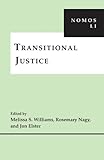Transitional Justice : NOMOS LI / Rosemary Nagy; ed. by Melissa S. Williams, Jon Elster.
Material type: TextSeries: NOMOS - American Society for Political and Legal Philosophy ; 34Publisher: New York, NY : New York University Press, [2012]Copyright date: ©2012Description: 1 online resourceContent type:
TextSeries: NOMOS - American Society for Political and Legal Philosophy ; 34Publisher: New York, NY : New York University Press, [2012]Copyright date: ©2012Description: 1 online resourceContent type: - 9780814725276
- 340/.115 23
- K5250 .T725 2012eb
- online - DeGruyter
| Item type | Current library | Call number | URL | Status | Notes | Barcode | |
|---|---|---|---|---|---|---|---|
 eBook
eBook
|
Biblioteca "Angelicum" Pont. Univ. S.Tommaso d'Aquino Nuvola online | online - DeGruyter (Browse shelf(Opens below)) | Online access | Not for loan (Accesso limitato) | Accesso per gli utenti autorizzati / Access for authorized users | (dgr)9780814725276 |
Frontmatter -- CONTENTS -- Preface -- Contributors -- Introduction -- 1. Theorizing Transitional Justice -- 2. Justice, Truth, Peace -- 3. Forms of Transitional Justice -- 4. Countering the Wrongs of the Past: The Role of Compensation -- 5. Reparations as Rough Justice -- 6. Reparations as a Noble Lie -- 7. Leviathan as a Theory of Transitional Justice -- 8. Transitional Prudence: A Comment on David Dyzenhaus, “Leviathan as a Theory of Transitional Justice” -- 9. What Is Non-Ideal Theory? -- 10. When More May Be Less: Transitional Justice in East Timor -- 11. Reconciliation, Refugee Returns, and the Impact of International Criminal Justice: The Case of Bosnia and Herzegovina -- Index
restricted access online access with authorization star
http://purl.org/coar/access_right/c_16ec
Criminaltribunals, truth commissions, reparations, apologies and memorializations arethe characteristic instruments in the transitional justice toolkit that can helpsocieties transition from authoritarianism to democracy, from civil war topeace, and from state-sponsored extra-legal violence to a rights-respectingrule of law. Over the last several decades, their growing use has establishedtransitional justice as a body of both theory and practice whose guiding normsand structures encompasses the range of institutional mechanisms by whichsocieties address the wrongs committed by past regimes in order to lay thefoundation for more legitimate political and legal order. In TransitionalJustice, a group of leadingscholars in philosophy, law, and political science settles some of the keytheoretical debates over the meaning of transitional justice while opening upnew ones. By engaging both theorists and empirical social scientists in debatesover central categories of analysis in the study of transitional justice, italso illuminates the challenges of making strong empirical claims about theimpact of transitional institutions. Contributors:Gary J. Bass, David Cohen, David Dyzenhaus, Pablo de Greiff, Leigh-AshleyLipscomb, Monika Nalepa, Eric A. Posner, Debra Satz, GopalSreenivasan, AdrianVermeule, and Jeremy Webber.
Mode of access: Internet via World Wide Web.
In English.
Description based on online resource; title from PDF title page (publisher's Web site, viewed 06. Mrz 2024)


